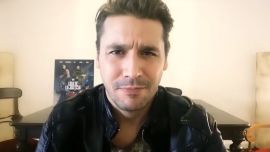A hundred years have cast a long shadow on the October Revolution, one of the most explosive political events of the 20th century. Barely a trace of that transformation remains in place, as the once countless statues of Vladimir Lenin have practically vanished from public squares and heraldic devices such as the hammer and sickle have been long discarded. What cannot be cast aside however is the far-reaching momentousness of that time in history – and its cultural substance.
The Teatro Argentino of La Plata is commemorating the Russian Revolution with a series of conferences and the premiere of Cien años, a song cycle with music by Martín Bauer and lyrics by Beatriz Sarlo, and a cameo by pianist Margarita Fernández. The team also includes Guillermo Anzorena (vocals), Lucas Urdampilleta (piano and musical direction), Federico Landaburu (clarinet), Diana Gasparini (viola), Sebastián Piatti (percussion) and Pompeyo Audivert (narration).
The composer and the author, who worked together previously on V.O., an opera on Victoria Ocampo which premiered in 2013, spoke to the Times about the Russian Revolution, the importance of the cultural avant-garde and the changes it fostered.
[Vladimir] Putin decided to commemorate the revolution officially, saying “you decide for yourselves” and examine it “professionally and objectively.” What does this commemoration mean for you?
Sarlo: Historians agree that the Russian Revolution marked the beginning of the 20th century. It is a deep transformation, which altered the course of not only Russia and then Europe but of the entire world. However one may judge this transformation, its global dimension cannot be denied. Whether you focus on the failure of its ideals and the authoritarianism of the regime, or you believe that whatever the peasantry and workers gained was worth the price of losing freedoms, it is evident that the Russian Revolution joins the French Revolution as two events that defined the last two centuries and a half.
Bauer: I have a personal, family relationship if you will, with the Russian Revolution, because I grew up in a Communist family. To the point where I actually represented Argentina in 1986 at the Festival of Political Songs held in East Berlin. My upbringing gave me this idealised view of Lenin, when the truth is it was a time of tremendous violence. Idealising Lenin is no easy thing.
How did you decide to work together again on this project?
Bauer: We had worked together before on V.O. and we wanted to do it again. I don’t exactly remember how it happened but with the 100th-year mark of the Russian Revolution drawing closer, we thought it would be a great idea to work together again.
Sarlo: We are close friends and see each other often. I don’t remember who was the first to say, ‘Hey, let’s do something about the Russian Revolution.’ It only seemed natural to work together again: Martín knows my musical tastes and I know his literary preferences.
Do you share any insights and opinions about the October Revolution?
Bauer: We were both interested in it, although we don’t share any particular insight. What we do share is a strong opinion that a revolutionary event such as the Red October is history-altering. We were both interested in the convergence of an extraordinary political moment and the work of cultural vanguards.
What does a concert performance mean in this case?
Bauer: This is not a conventional concert, it is made up of songs, like lieder if you will. But there is a minimum intervention onstage by Margarita Fernández, there are costumes and lighting elements, and the songs tell a story somehow, so we called it a concert performance.
What was it like for you to write the text for these songs, Beatriz? What draws you to this kind of endeavour?
Sarlo: For starters, well put, they are songs. They are not poems as I’m not a poet and it never even crossed my mind to present these works as poems. But my background as a literary critic, which comes from the 1960s, gave me the necessary training to look at poetry from a technical standpoint. I enjoy working with difficult verses, like the 11-syllable verse, I like working with these technical devices that I know as a literary critic. Also, every time I worked with Martín we did so on topics which have a high ideological and aesthetical appeal.
Considering the amount of material you had at your disposal, both in terms of aesthetics and content, did you focus on a specific period?
Sarlo: We focused on the period of effervescence between 1917 and Lenin’s death because we wanted to remember the Russian Revolution through what it meant and not the horrors of Stalin’s repression. Even the critics of the time, which identified strong streaks of authoritarianism, never saw the end of that process which would lead to Stalin. Our songs draw on Marx’s 11th thesis on Feuerbach and therefore our focus is on the philosophical lineage of that Marxism. We start from Lenin’s April Theses and move on to the manifest of the avant-garde.
Bauer: We didn’t want to focus on the aftermath, especially given how these artists suffered: Mayakovsky ended up committing suicide, Meyerhold was tortured and executed… Just think that for the first anniversary of the Revolution, Mayakovsky staged the Mystery-Bouffe, directed by Meyerhold, with art by Malevich. That trio right there is just breathtaking… There are few other such instances, perhaps the Ballets Russes with Stravinsky and Picasso. These are unparalleled situations, even from a global viewpoint.
What is the layout of these songs?
Sarlo: There is no plot per se, you can think of them as a series of paintings, like landscapes or portraits in an exhibition.
Is there a dialogue between them?
Sarlo: There is indeed. But we don’t expect someone who hears them for the first time to capture that dialogue. However, in order to maintain a certain unity, as fragmentary as it may be, you must have a strong underlying dialogue. Martín was thinking about song cycles as a journey, like Schubert’s Winterreise, so we imagined this journey through Petrograd and Moscow.
In 1918, Aleksandr Blok wrote in his poem The Twelve about Red Guards roam the streets of Petrograd, shooting blindly in the blizzard, led by their sense of revolutionary duty and, most controversially, a figure of Jesus Christ. That same year, Mayakovsky declared a war on the past, writing that “it’s time to pepper museum walls with bullets.” What does their revolutionary stance mean in today’s society, where ‘revolution’ is such an overused word?
Bauer: I would say two things. Focusing on the quote from Mayakovsky, although it’s not a direct reference, we mention Duchamp and his Fountain, which, coincidentally, was also created 100 years ago. We did this exercise where we imagine how it would have been for Duchamp to go to Moscow. That idea of conceptual art is not conceptual in Mayakovsky’s case, but it does pull art outside the museum. And that idea triumphed. Secondly, despite being subjected to harassment and political persecution, these artists prevailed even after their death and even during Stalinism. The avant-garde embraced the revolution, there was an ambivalence of sorts at play there… the artists and the revolution scraped along as fellow travellers for a while but then their divorce was fatal.
Are we fascinated by this because the idea of such a revolution would be virtually impossible nowadays?
Sarlo: We don’t experience that effervescence today, when the avant-garde is managed by museum curators... it fascinates us because I would say that there is no cultural avant-garde today, there are only aesthetic renewals. I would venture to say that the avant-garde is a historical form now, which holds in its core the idea of storming a place, seizing it. That idea no longer exists in today’s world, where the arts don’t feel they have to dislocate and resettle anything and are more concerned with gaining terrain in the relationship between museums and the market.
WHEN AND WHERE
Teatro Argentino of La Plata.
Sala TACEC, calles 9 y 53, La Plata. October 28 and 29, starting 8pm.
Tickets at 100 pesos available at the box office and www.tuentrada.com. More info: www.gba.gob.ar/teatroargentino


























Comments